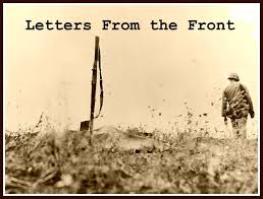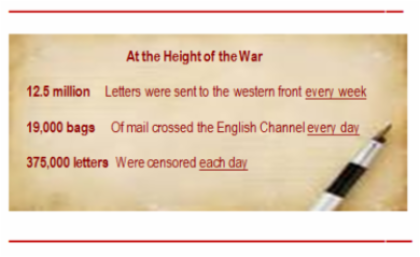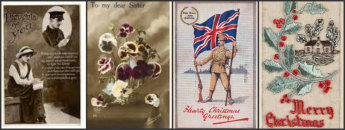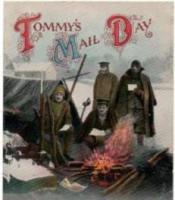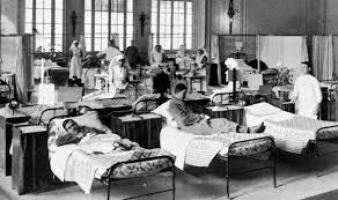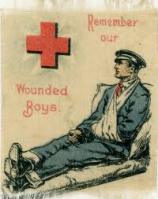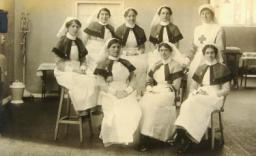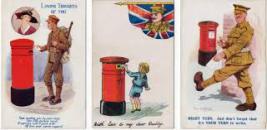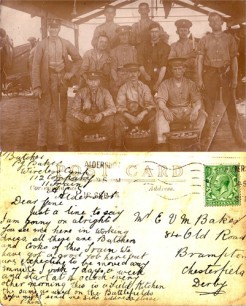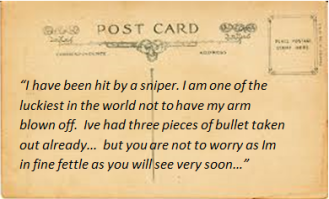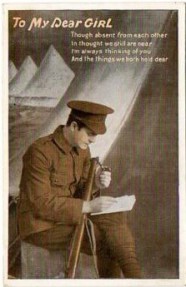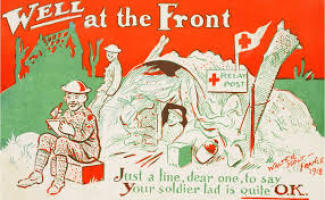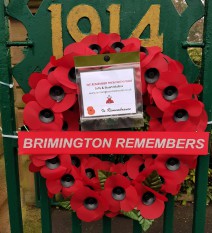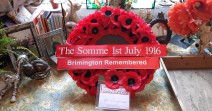
LETTERS FROM THE FRONT
First-hand accounts of Brimington soldiers’ lives and deaths on the front line. Written by the men themselves, by the officers and friends who fought beside them and the
nurses who tended them.
Some died, and some survived the lottery of the Great War
Taken from newspapers, personal
accounts and quotes
Our thanks especially to The Derbyshire Times, National Archives &
British Newspaper Archives
Soldiers were also encouraged to write letters to friends and family at home.
Most men decided it would be better to conceal the horrors of the trench warfare.
As a result of the Defence of the Realm Act of 1914,
all letters written by the men were censored by officers
FACING THE ENEMY
Soldiers words from the front
March 1918
Private J Fry in a letter to his sister in Foljambe Road wrote..
"... the Hun put up a bit of a show and has been at us for days with no rest.... I am out of the line for a while with a shoulder wound. Its nothing serious and tell mother I got her parcel of toffees and cigs' he added... ''and give her my love....'
Private Fry survived the war and returned home to Brimington.
April 1917
Brimington soldier in a letter to
his mother describes and encounter
with the Germans----
“… we had taken many prisoners – young
and old. The Prussians will stand against anything – except the Scots in their kilts. They have christened them ‘mad women in skirts!”
Mad women in skirts !”
November 1914 - Private George Symonds - (Brockhill, Brimington) in his last letter home before his was killed a few days later - wrote......
".... fine firework displays every night from the enemy shells flying overhead "
(Private Symonds remains were never found and he is remembered on the Menin Gate)
“ .. we are not cowed! “
April 1915
From a Brimington soldier in the front line, “And two riflemen in our company are picking off the Germans easily from a distance-
they’ve down a dozen or more and winged just as many…
Sergeant says they are the best shots in the battalion”
Aug 1917
Private Walter Willis wrote to his mother at Coronation Road –
‘They never give up (he said of the enemy) but neither do we.
Our lads have given as good we get.
For every shell they send – we do the same. And there are more of them but we are not cowed!’
TERRIBLE INJURIES
Many Brimington soldiers suffered life-changing injuries and survived. Their wounds were described in graphic detail in letters home
Brimington Soldier loses his leg
Private Norman Butler in a letter to his mother in Princess Street, Brimington, informed her that his wound had turned out more serious than was expected and that it had been necessary to amputate his right leg.
He writes that he is comfortable considering his injury and that she was not to worry
as he expects to be alright. Unfortunately the solider is only 22 years of age.
(Norman returned to Brimington and lived in the area until his death in 1966 aged 70)
1915
Private A Cocking to his brother in Station Road, Brimington -
"... been in some heavy fighting in the Dardanelles and Im in hospital with severe wounds in back and legs.... not sure if I will recover sufficently ever to return to work....
"..severe wounds in back"
1916
Private Neale in a letter to his mother in Queen Street, Brimington
"..my wounds are in my left arm, hand and also my head. I fear I have lost my hearing, but I pray not my sight"
"..I pray not my sight"
1917
Letter written for Private Hatten to his brother in Victoria St, Brimington -
"Private Hatten was badly wounded in the ankle and now lies in a military hospital in Aldershot where his leg has been amputated but below the knee"
"...amputated below the knee"
March 1915
Private Joseph Norton - Horrific Wounds
During the battle of Neuve Chappelle, the Brimington soldier received horrendous injuries. He received a bullet wound to his left leg and as he tried to drag himself to a safer place another bullet pierced his right eye resulting in a 'total loss of that important member'
Somehow, he survived the battlefield and was shipped home to Chatham Hospital. He had served in India, China, and the South African War, which he said was nothing like the present war. He said that ‘cold-blooded murder’ better describes the situation on the western front.
The soldier was eventually fitted with a glass eye and returned to Brimington where he died in 1939 aged 58
"cold-blooded murder’ better describes the situation on the western front"
8th July 1916
Mr & Mrs Nadin of Victoria Street, New Brimington have received a telegram from the War Office stating that their son Private Sims Nadin, Grenadier Guards is lying very seriously ill in hospital in France.
Their brief information was followed by a letter from Sister M Hopton, No.17 Casualty Clearing Station, France which reads as follows-
“ I am very sorry to tell you that your son was admitted to this hospital early this morning severely wounded through the back and abdomen.
Everything has been done and he is having every care and attention”
According to his records it took the Brimington man several years to recover from his terrible wounds, but was an invalid for most of his life. He died in Chesterfield in 1957
Aug 1915 Boer War Hero Wounded
Mrs Sherriff of Brimington Common, received a letter from her husband Corporal Uriah Sherriff....
written from a hospital in Alexandria in which he states that on Sun 8th August he was wounded in the hand, and that his left hand has been taken
off. He added that the sisters at the hospital are very good to him and
he expects to be coming home soon, as he will be no more good for fighting.
Corporal Sherriff lived to be 81 years old and died in Chesterfield in 1961
“….left hand taken off ”
WITH HIS FRIEND WHEN HE DIED
Many village lads served side by side at the front and witnessed their friend’s deaths
“leg blown off..”
July 1916
Private Ernest Cappendale (Lincolnshire Regiment) wrote home to his mother in King Street Brimington, from him hospital bed
in France
‘I’ve been wounded in the thigh, back and arm… operation tomorrow to remove bits of shells from my back.
' He went on to describe how it happened.
‘The enemy dropped a big shell smack in the trench. It knocked two out, missed one altogether and hit me and Ernie Jervis. He shouted to me to ask if I was hit, I told him yes, he said it had blown his leg off, I don’t know where he is or how he is getting on’
Private Ernie Jervis died that day and his body was never found – he is remembered on the Thiepval Memorial. Private Cappendale survived the war and returned home to Brimington
Aug 1915
Private Ernest Edinboro of Church Street Brimington, wrote to his
father about the death of his friend Private Fred Brown -
‘I was quite close to Fred when his death blow came, and I hope to convey my deepest sympathy to his dad and all. He is buried not far back from where I am – just at the back of the
firing line - and I can assure you and his people that I will do my best to look after his grave.
Private Fred Browns grave was never found, and Private Edinboro was killed in action 31st July 1916 . Both men are remembered on the Ypres Menin Gate.
Apr 1917
Written from the trenches by a friend of Private Sid Farrow, he described his friends death '…we were standing together in the German 4th line when a shell burst and Sid was killed...
He was hit in the back and said ‘Oh God’ then he clasped his hands together and was gone!’
Private Sid Farrow was later buried in -Bailleul Road East Cemetery, Northern France
" Oh God!' he said ' then died"
'
COMMANDING OFFICERS PAINFUL DUTY
In Quotes and Letters
‘ .. He has proven himself exceedingly capable and undoubtedly one of our
most valuable NCO’s – the loss of Serg George is felt by all of us officers and men alike’
Letter from commanding officer to Serg Albert Georges wife, following the Brimington soldier’s death from wounds in (Nov 1917)
Written by Platoon Sergeant Ingleton to Serg Walter Malam’s sister in Cotterhill
Lane
‘….I felt it my duty to tell you that he was shot through the heart and shoulder – we did what we could to ease his pain but he did not suffer long’ (Jan 1916)
Lieut-Colonel Goodman – in a letter to Private Fred Browns family
‘He died like a true British soldier” (Aug 1915)
L/Corp E Newberry’s Commanding Officer
‘… he was cool and brave in performance of his duties and I beg
you to take heed of those words and find comfort” (Apr 1917)
Private Walter Turners Commanding Officer –
‘Your son has gone where the horrors of war can no longer
trouble him’ (Oct 1917)
Private Arthur Turners Commanding Officer’s remarked to the soldiers
parents
‘… your son was hit in the heart by a shrapnel bullet… he was one of
my best men… full of pluck and always cheerful’ (July 1916)
Apr 1917 Captain L M Glasson writing to the parents of Corp Edgar Nadin (Victoria Street)
“… He was by far the best corporal
in
my Company and I looked upon him
as an ideal soldier.
I always found him as all the best soldiers
are – the best of men and he was I know
universally popular in the Company.
The army has lost a future Sergeant-Major
and I have lost someone I would have given anything to keep”
July 1916 Sister R B Downing of the No.13 BEF Hospital to Private Harry Marshall’s sister in Coronation Road…
“..you will have heard the sad news of your brother. He came in hospital this morning about 9 o’clock but only lived until 12 o’clock.
He passed away peacefully. His last words were “ You will tell my sister, won’t you?”
" You will tell my sister,
won’t you?”
April 1917 - Mrs Allen, (Heywood Street) – mother of six and already terminally ill with throat cancer, received the following letter from Lieutenant Elwood about her husband’s death.
“…..with deep and sincere regret I have to inform you of the death of your husband who died the death of a hero. He saw no fear and did splendid service to his Company in carrying messages. It was while he was doing this work that he was killed instantly and thereby suffered no pain.
Let me ask you, although I know your feeble condition, to bear this heavy blow with courage, as your husband would wish you. I sincerely trust the Great Comforter will endure you with strength necessary to bear the burden "
Trust the Great Comforter”
July 1916
Private Herbert Smith (Brimington Common)
From Lady Hughes who was writing on behalf of Private Collins (South Wales
Borderers) who could not read or write..
‘He feels sure you will be comforted to know that he buried your son on 24th July alongside his comrades in a wood where he fell and he was reverently buried. He took from his
pocket a match box and pocket book which I will send you "
Private Smiths grave was never located – he is remembered on the Thiepval Memorial to the missing.
KEEPING UP MORALE
Despite the hardships and the constant fear Brimington soldiers attempted to put on a brave face in their
letters and postcards home.
Private Phineas J Baker (ASC) Station Road, Brimington ( Far left standing) sent this postcard from Salonika, Greece to his brother Gene in Brampton, Chesterfield.
Transcription –
Dear Gene
Just a line to say I am going on alright. You see me here in working dress - all
these are butchers and cooks with this train. We are expecting to be
moved any minute. I work 7 days a week. And start at 4 o’clock every other morning. This is a field kitchen the same as we used on the battlefields – you might send me
*Sid’s address please
Phin.
* Sid was his brother who was killed in action only months later in Nov 1915 - and Phineas himself was killed 24th September 1916
Below - extract from a post card sent by L/Corp James Hall -2nd/5th Bn KOYLI to his mother in Brimington - Oct 1917
Mar 1915 Private Norton following his terrible injuries wrote home to tell his family -
“…..
the ambulance work of our army was brilliant..” and he was sure “..most of the men have at one time or other done as brave a deed as was ever rewarded with
a VC”
Aug 1915 Brief note from a Brimington soldier to his family -
‘'Tell Mr & Mrs Fretwell not to bother as Joes wounds are not as serious as they might think, they are just enough
to get him back to Brimington for a
few weeks !!
Oct
1916
“… the grub is plentiful and very good as always and on time regardless
of the situation “
In a letter from Private A Swift of Devonshire St to his family
Nov
1915
“We had a pretty hot time of it, but we got well looked after in all respects. The
billet and food were very good were my mates, so no complaints”
Private Jack Newcombe to his father in Station Road
Nov 1918
"I’m in very little pain
now and progressing favourably, so you are not to worry any more. I will be home very soon thank the Good Lord”
Private W Sambrook to his parents in Princess Street
Acknowledgements/Source Material:
Family donations/ Derbyshire Times & Chesterfield Herald / Derbyshire Courier / Sheffield Evening Telegraph/ Derby Daily Telegraph/ Lincolnshire Chronicle/Johnsons Press/ British Newspaper Archives/London Gazette/National Archives/WW1 Posters
Not Forgotten Brimington Not Forgotten Brimington
